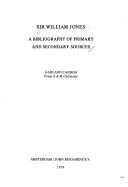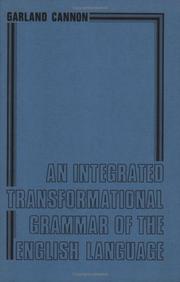| Listing 1 - 10 of 19 | << page >> |
Sort by
|
Book
ISBN: 0820404039 Year: 1987 Publisher: New York, N.Y. Lang
Abstract | Keywords | Export | Availability | Bookmark
 Loading...
Loading...Choose an application
- Reference Manager
- EndNote
- RefWorks (Direct export to RefWorks)
Lexicology. Semantics --- Historical linguistics --- English language --- -Linguistic change --- Change, Linguistic --- Language change --- Language and languages --- Germanic languages --- Word formation --- Linguistic change. --- Word formation. --- Linguistic change --- Morphology

ISBN: 9027209987 9786613359858 1283359855 9027281203 9789027281203 9789027209986 9789027209986 Year: 1979 Publisher: Amsterdam
Abstract | Keywords | Export | Availability | Bookmark
 Loading...
Loading...Choose an application
- Reference Manager
- EndNote
- RefWorks (Direct export to RefWorks)
Sir William Jones (1746 -1794) was an Anglo-Welsh philologist and scholar of ancient India, particularly known for his proposition of the existence of a relationship among Indo-European languages. His third annual discourse before the Asiatic Society on the history and culture of the Hindus (1786) is often cited as the beginning of comparative linguistics and Indo-European studies. Jones' interdisciplinary scholarship innovatively combined language and linguistic study with the traditional subjects of research to throw light on transcending questions like the origins of man and culture. This bibliography aims to provide an overview of the full width of his writings and secondary scholarship.
Linguistics --- Jones, William --- Civilization, Oriental --- -Oriental languages --- -Languages, Oriental --- Civilization, Eastern --- Eastern civilization --- Oriental civilization --- Bibliography --- Jones, William Sir --- -Bibliography --- Orient --- -East --- Asia --- Oriental languages --- Languages, Oriental --- Jones, William, --- Iones, Guilielmus, --- Jones, Guilielmus, --- Jones, Oriental, --- Jones, W. --- Bibliography. --- East --- Indo-Aryan philology --- Pali philology --- Biography --- Iones, Guilielmus --- Jones, Guilielmus --- Jones, Oriental
Book
Year: 1960 Publisher: Indianapolis Bobbs-Merrill
Abstract | Keywords | Export | Availability | Bookmark
 Loading...
Loading...Choose an application
- Reference Manager
- EndNote
- RefWorks (Direct export to RefWorks)
Book
Year: 1979 Publisher: Amsterdam Benjamins
Abstract | Keywords | Export | Availability | Bookmark
 Loading...
Loading...Choose an application
- Reference Manager
- EndNote
- RefWorks (Direct export to RefWorks)
Book
Year: 1978 Publisher: Amsterdam Rodopi
Abstract | Keywords | Export | Availability | Bookmark
 Loading...
Loading...Choose an application
- Reference Manager
- EndNote
- RefWorks (Direct export to RefWorks)

ISBN: 9062034004 9789062034000 9789004483620 Year: 1978 Publisher: Amsterdam Editions Rodopi N.V.
Abstract | Keywords | Export | Availability | Bookmark
 Loading...
Loading...Choose an application
- Reference Manager
- EndNote
- RefWorks (Direct export to RefWorks)
English language --- Grammar --- Grammar, Generative --- Generative grammar --- French (Language) --- Langue d'oïl --- Romance languages --- Germanic languages

ISBN: 0521391490 0521025265 0511527144 9780521025263 9780521025263 9780511527142 9780521391498 Year: 1990 Publisher: Cambridge Cambridge University Press
Abstract | Keywords | Export | Availability | Bookmark
 Loading...
Loading...Choose an application
- Reference Manager
- EndNote
- RefWorks (Direct export to RefWorks)
Sir William Jones is best known for his famous Third Discourse of 1786 in which he proposed that Sanskrit's affinity to Greek and Latin could be explained by positing a common, earlier source, one known today as Indo-European. This brilliant thesis of language families laid the groundwork for modern comparative linguistics. Jones's interests and achievements, however, ranged far beyond language. He studied and made contributions to astronomy, botany, history, law, literature, music, physiology, politics, and religion. He served as a Supreme Court justice in India and founded the Asiatic Society, which stimulated worldwide interest in India and the Orient. He was friends with many of the leading intellectuals of his day and corresponded with Benjamin Franklin in America and with Burke, Gibbon, Johnson, Percy, and Reynolds in Britain. In his short life he mastered so many languages that even in his own time he was regarded as a phenomenon; and so he was. Garland Cannon, editor of The Letters of Sir William Jones, has written a new definitive biography of this fascinating man, who in his life and works teaches us that the path to understanding and appreciating the art and literature of a great culture very different from our own is through devoted study, a tolerant spirit, and an unquenchably curious mind.
Middle East specialists --- Great Britain --- Biography --- Jones, William, Sir, 1746-1794. --- Orientalists - Great Britain - Biography. --- Arts and Humanities --- Literature --- Oriental languages - Study and teaching - England - History - 18th century --- Orientalists - England - Biography --- Sanskritists - England - Biography --- Philologists - England - Biography --- Jones, William, - Sir, - 1746-1794 --- Oriental languages --- Asianists --- Sanskritists --- Philologists --- Study and teaching --- History --- Jones, William, --- Scholars --- Languages, Oriental --- Philologians --- Linguists --- Iones, Guilielmus --- Jones, Guilielmus --- Jones, Oriental --- Jones, W. --- Jones, William --- Orientalists
Book
Year: 1964 Publisher: Bombay,New York : Asia Pub. House [for] Indian Council for Cultural Relations,
Abstract | Keywords | Export | Availability | Bookmark
 Loading...
Loading...Choose an application
- Reference Manager
- EndNote
- RefWorks (Direct export to RefWorks)
Book
ISBN: 3447037644 Year: 1996 Publisher: Wiesbaden Harrassowitz
Abstract | Keywords | Export | Availability | Bookmark
 Loading...
Loading...Choose an application
- Reference Manager
- EndNote
- RefWorks (Direct export to RefWorks)
English language --- Japanese language --- Foreign words and phrases --- Japanese --- Dictionaries --- Influence on English
Book
Abstract | Keywords | Export | Availability | Bookmark
 Loading...
Loading...Choose an application
- Reference Manager
- EndNote
- RefWorks (Direct export to RefWorks)
| Listing 1 - 10 of 19 | << page >> |
Sort by
|

 Search
Search Feedback
Feedback About UniCat
About UniCat  Help
Help News
News